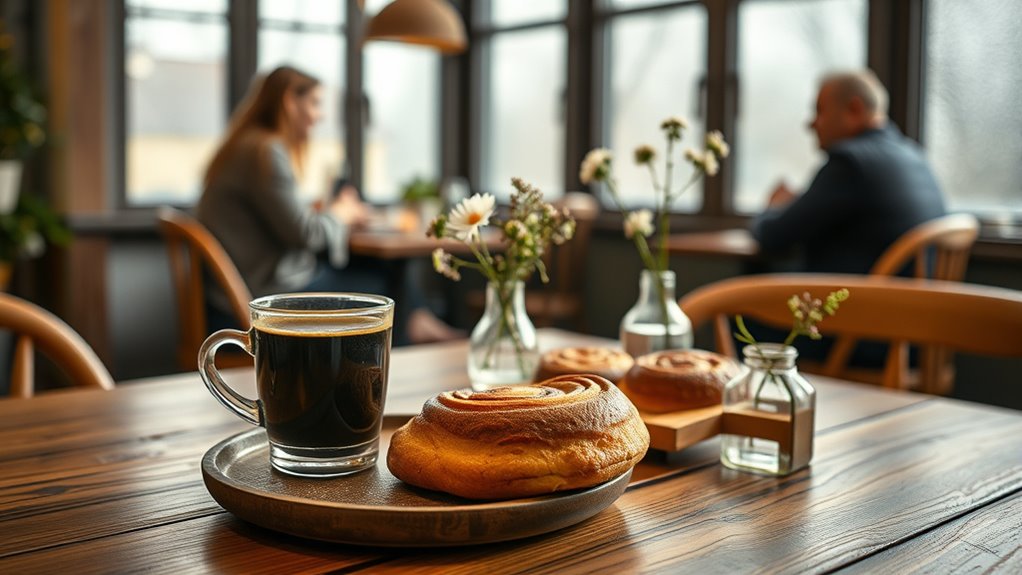Across cultures, taking intentional breaks like Sweden’s fika can boost your productivity and well-being. Fika and other coffee traditions emphasize social connection and mental refreshment, helping you stay focused and avoid burnout. Incorporating these practices into your routine encourages structured pauses and healthier work habits. Understanding global approaches to work and rest can transform your daily routine—if you explore further, you’ll discover even more practical ways to optimize your workday.
Key Takeaways
- Cultural coffee breaks like Sweden’s fika foster social connection and mental refreshment, boosting overall productivity.
- Scheduled breaks, inspired by global traditions, help prevent burnout and improve focus during work routines.
- Integrating cultural practices into remote work routines reduces isolation and enhances mental well-being.
- Combining cultural insights with time management tools optimizes work and break balance for better efficiency.
- Regular, intentional pauses encourage sustained engagement, reduce fatigue, and promote sustainable, healthy work habits.

Across the globe, different cultures and work practices reveal valuable lessons on boosting productivity. One of the most fascinating examples is how various countries incorporate breaks into their work routines, such as the Swedish tradition of fika. Fika isn’t just about coffee; it’s a deliberate pause in the day for social connection and refreshment. This simple yet effective practice shows you that taking regular, intentional breaks can actually enhance your focus and productivity when you return to work. It’s a reminder that stepping away from your tasks, even briefly, prevents burnout and maintains your mental clarity. If you work remotely, integrating a fika-like routine can help structure your day, making your work sessions more productive and less isolating. Scheduling dedicated coffee breaks signals to your brain that it’s okay to pause, recharge, and then dive back into your tasks with renewed energy.
In today’s remote work environment, managing your time efficiently becomes vital. That’s where time tracking tools come into play. They are invaluable for keeping you aware of how you’re spending your hours, helping you identify and eliminate distractions. When you’re working from home, it’s easy for your focus to drift or for work hours to extend beyond what’s healthy. By actively tracking your time, you can set clearer boundaries, ensuring you allocate sufficient time for deep work and breaks alike. This practice encourages discipline and prevents burnout, making your workday more balanced and productive. Incorporating time tracking also helps you recognize patterns—when your concentration wanes or when you’re most productive—and allows you to optimize your schedule accordingly. Additionally, adopting sustainable work habits inspired by global practices can contribute to long-term well-being and efficiency.
Combining the cultural insight of taking regular, meaningful breaks with practical tools like time tracking creates a powerful strategy for boosting productivity. You learn to value the importance of pauses and social interactions as part of your workday, rather than seeing them as interruptions. Simultaneously, you gain a clearer understanding of how your time is spent, enabling you to make smarter decisions about when to focus intensely and when to step back. Whether you’re working remotely or in an office, adopting these lessons from around the world can help you develop a more sustainable, focused, and satisfying work routine. Embracing these cultural and practical approaches ensures you stay engaged, prevent fatigue, and ultimately, get more done with less stress.
Frequently Asked Questions
How Do Different Cultures Define a Productive Workday?
You might notice that different cultures define a productive workday based on their cultural work norms and productivity mindset. Some prioritize long hours and constant activity, believing that dedication equals productivity. Others value balance, breaks, and collaboration, seeing these as integral to efficiency. Your understanding of a productive workday shifts as you embrace diverse perspectives, recognizing that success isn’t just about hours worked but also about maintaining well-being and fostering creativity.
What Role Does Social Interaction Play in Workplace Efficiency?
Imagine your workplace as a lively garden, where social interaction acts like sunlight, nurturing growth. You see, cross-cultural communication and team bonding spark collaboration, creativity, and trust. When you engage with colleagues, barriers break down like walls of fog, revealing shared goals. This vibrant exchange energizes everyone, boosting efficiency. So, fostering social interaction isn’t just about chatting—it’s about cultivating a thriving ecosystem for success.
Are Coffee Breaks Linked to Increased Employee Well-Being?
You might notice that coffee break culture boosts employee wellness by offering a chance to relax and recharge. Taking regular breaks helps reduce stress and improves overall well-being. When you step away from work for a coffee, it fosters social connections and mental refreshment. These small moments of pause are linked to increased happiness, better focus, and a healthier work environment, ultimately supporting your productivity and job satisfaction.
How Can Companies Adapt Global Coffee Traditions Locally?
You can’t just transplant a coffee tradition and expect it to thrive; it’s like putting new wine in old bottles. To succeed, focus on cultural adaptation and local integration by understanding what coffee breaks mean in your community. Encourage employees to share their customs, incorporate local flavors, and create a relaxed atmosphere. This approach fosters genuine engagement, making breaks more meaningful and boosting overall well-being.
What Are the Psychological Benefits of Taking Regular Breaks?
Taking regular breaks offers you significant psychological benefits, including improved mindfulness meditation and stress reduction. When you step away from work periodically, you give your mind a chance to reset, reducing anxiety and enhancing focus. These breaks help you feel more balanced and resilient, making it easier to handle challenges. By prioritizing time for breaks, you support your mental well-being, leading to increased overall productivity and a healthier work routine.
Conclusion
By exploring coffee break traditions like fika from around the world, you see that sometimes, taking a pause is the best way to boost your productivity. These customs remind you that work isn’t just about grinding nonstop but finding moments to recharge. So, don’t be afraid to slow down and savor your breaks—you might find they’re the secret sauce to working smarter, not harder. After all, a little downtime can go a long way.









